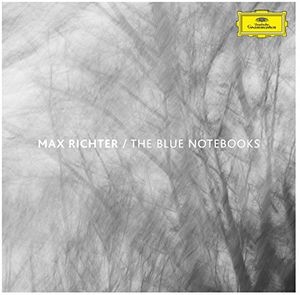|
フォーマット |
CD |
|---|---|
|
構成数 |
1 |
|
国内/輸入 |
輸入 |
|
パッケージ仕様 |
- |
|
発売日 |
2015年02月24日 |
|---|---|
|
規格品番 |
4794443 |
|
レーベル |
|
|
SKU |
028947944430 |
構成数 | 1枚
合計収録時間 | 00:47:10
Personnel: Max Richter (piano, electronics); Louisa Fuller, Natalia Bonner (violin); John Metcalfe (viola); Philip Sheppard, Chris Worsey (cello). Audio Mixer: Max Richter . Recording information: Eastcote Studios (2003); Hear No Evil Studios (2003); Studio Scoring Stage, Babelsberg (2003); Eastcote Studios (2010); Hear No Evil Studios (2010); Studio Scoring Stage, Babelsberg (2010). Photographers: Yulia Mahr; Wolfgang Borrs. Though his evocative debut album Memoryhouse introduced Max Richter's fusion of classical music, electronica and found-sounds (a style he calls "post-Classical"), it's his follow-up, The Blue Notebooks, that really showcases the style's -- and Richter's -- potential. The album's ten pieces were inspired by Kafka's Blue Octavo Notebooks, and quotes such as "Everyone carries a room about inside them. This fact can even be proved by means of the sense of hearing. If someone walks fast and one pricks up one's ears and listens, say at night, when everything round about is quiet, one hears, for instance, the rattling of a mirror not quite firmly fastened to the wall," which are read by actress Tilda Swinton, define the spare, reflective intimacy of The Blue Notebooks. The album is simpler than Memoryhouse, with a smaller ensemble of musicians playing on it and a shorter running time, but its restraint makes it a more powerful work -- it's so beautiful and fully realized that it doesn't need to be showy. As other reviews have mentioned, Richter tends to be a more traditional-minded composer than influences like Brian Eno, Philip Glass and Steve Reich. However, his sound works so well and seems so natural because he's not trying to be overtly experimental; the album ranges from pieces with little or no electronic elements, such as the piano-driven "Arboretum," to "Old Song," which is based on a busy, chilly beat that sounds like dripping water. Richter's music embraces all of the sounds that had an impact on him, but more important is the emotional impact that The Blue Notebooks has on its listeners; despite its high-concept origins, it's quite an affecting album. The warm-hearted piano melody on "Horizon Variations" and the delicate, somehow reassuring-sounding string piece "On the Nature of Daylight" both sound vaguely familiar, and are all the more haunting for it. Most striking of all is "Shadow Journal," which begins with hypnotic, bubbling electronics, Swinton's crisp voice and a piercingly lovely violin melody and then brings in harp and an electronic bassline so low that it's almost felt more than it is heard. The piece sounds so much like thinking, like turning inward, that the cawing birds at the end of the track bring a jarring end to its reverie. The field recordings that run through The Blue Notebooks heighten the sense of intimacy, and occasionally, eavesdropping. On "Organum," the distant piano and outdoor sounds feel like listening to somebody else listen to the music; meanwhile, the ticking clocks, clacking typewriter and street traffic on the title track help conjure up that room that everyone carries about inside them. The Blue Notebooks is a stunning album, and one that should be heard not just by classical and electronica fans, but anyone who values thoughtful, subtly expressive music. ~ Heather Phares
-
1.[CD]
-
1.Blue Notebooks, The
-
2.On the Nature of Daylight
-
3.Horizon Variations
-
4.Shadow Journal
-
5.Iconography
-
6.Vladimir's Blues
-
7.Arboretum
-
8.Old Song
-
9.Organum
-
10.Trees, The
-
11.Written on the Sky
-
12.On the Nature of Daylight
-
欲しい物リストに追加

コレクションに追加
サマリー/統計情報
 セブン-イレブン受け取り
セブン-イレブン受け取り
お早めのご注文で発売日前日にお届けいたします
山口県・四国・九州・沖縄県
フラゲ注文受付期間は地域によって異なります。
お住まいの地域をご確認ください。

発売日前日
にお届けします発売日当日
にお届けしますフラゲ注文受付期間は地域によって異なります。
お住まいの地域をご確認ください。

